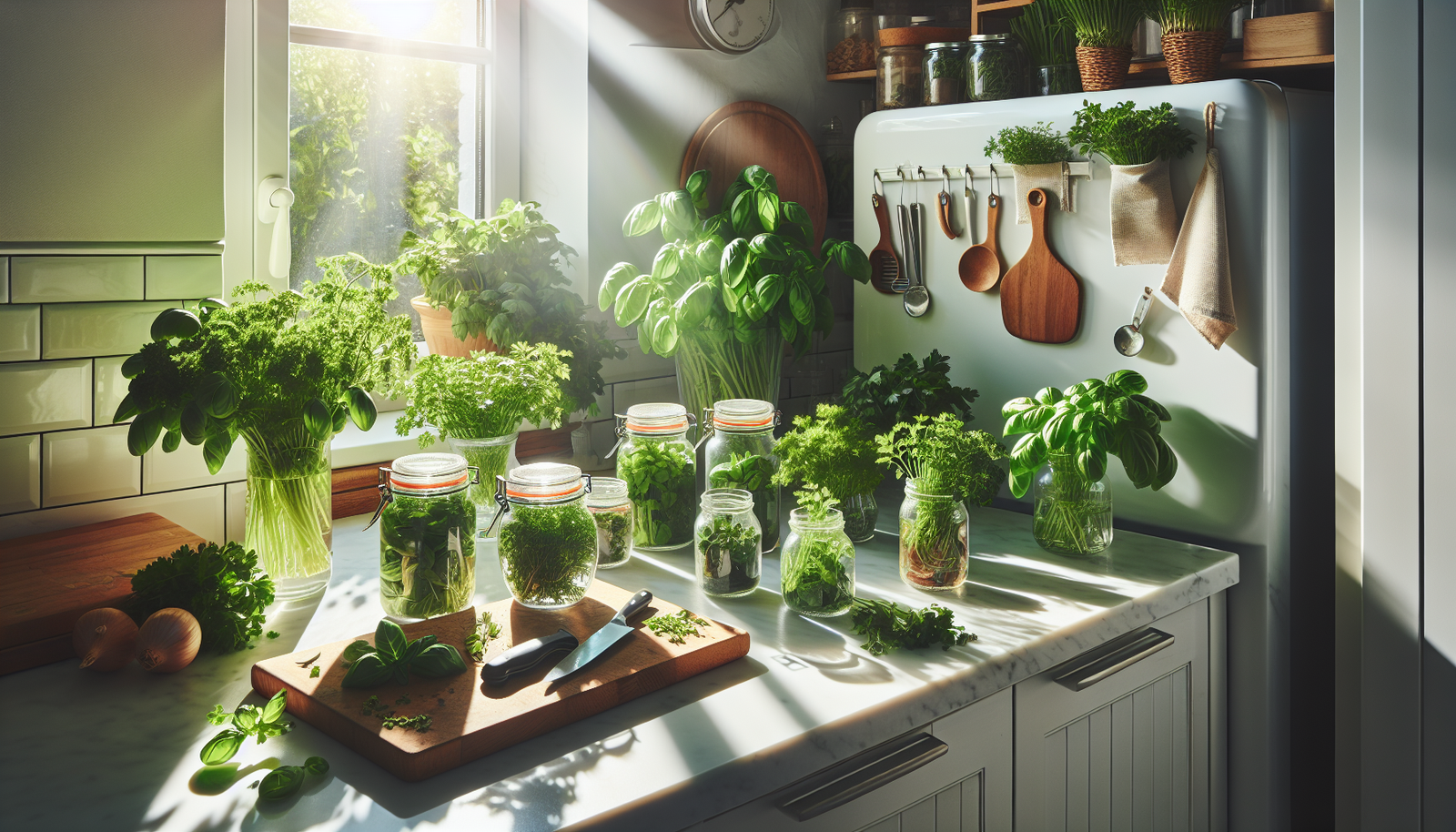
How to Store Fresh Herbs to Keep Them Fresh Longer
Store fresh herbs correctly, and you can extend their life significantly, saving both money and flavor. Did you know that nearly 40% of fresh herbs go to waste because they aren’t stored properly? This guide offers practical tips on preserving their freshness, ensuring your basil, cilantro, and parsley stay vibrant for longer. We’ll explore simple techniques, from refrigeration to using damp paper towels, that maintain the herbs’ aroma and potency. Discover how a few easy steps can keep your kitchen stocked with fresh, flavorful herbs, enhancing your cooking experience.
Proper Storage Techniques for Fresh Herbs
Fresh herbs add vibrant flavors and aromas to any dish. To keep these essential ingredients at their best, proper storage is crucial. This section will guide you through storing various fresh herbs to maintain their maximum freshness and longevity.
How to Store Fresh Basil for Maximum Freshness
Basil is a delicate herb that thrives with a little extra care. To store fresh basil effectively, begin by trimming the ends of the stems. Fill a glass or jar with an inch of water and place the basil stems inside, ensuring the leaves remain above water. Cover the leaves loosely with a plastic bag and store at room temperature. This method mimics a vase of flowers, keeping the basil hydrated and vibrant.
Avoid refrigerating basil as it can cause the leaves to blacken and lose flavor. If you must refrigerate, wrap the leaves gently in a paper towel and place them in a resealable bag, leaving it slightly open to prevent moisture buildup. This simple technique can extend the life of basil for several days, maintaining its fresh taste and aroma.
Maintaining the Longevity of Fresh Cilantro
Cilantro, with its unique aroma, can be challenging to store. Start by gently washing and thoroughly drying the leaves. Then, trim the stems and place them in a jar of water, similar to basil. Cover the leaves with a plastic bag to maintain moisture balance, and store in the refrigerator. This method keeps cilantro fresh for up to two weeks.
An alternative method is to wrap cilantro in a damp paper towel and place it inside a plastic bag in the fridge. This approach helps maintain the herb’s hydration while protecting it from excess moisture. Regularly change the water or paper towel to prevent spoilage and enjoy the vibrant taste of cilantro for longer.
Best Ways to Store Fresh Mint Leaves
Mint, known for its refreshing aroma, requires specific storage techniques to retain its crispness. Trim the ends of the mint stems and place them in a glass of water. Cover the leaves with a plastic bag and store in the refrigerator to keep them perky and fresh. Change the water every few days to prevent bacterial growth.
Alternatively, you can wrap mint sprigs in a damp paper towel and store them in a sealed plastic bag in the fridge. This prevents wilting and maintains the mint’s vibrant flavor. Ensure the towel remains slightly damp but not soggy, as excess moisture can lead to decay.
Extending Shelf Life of Aromatic Herbs
Aromatic herbs like rosemary, thyme, and oregano offer robust flavors to dishes. Proper storage is key to keeping them at their best. This section will explore techniques to prolong the shelf life of these herbs, ensuring you get the most out of their aromatic potential.
Storing Fresh Rosemary and Thyme for Longer Use
Rosemary and thyme are hardy herbs, yet they still require careful storage to stay fresh. Rinse them gently and dry thoroughly before storage. Wrap the herbs in a slightly damp paper towel and place them inside a resealable bag in the refrigerator. This method keeps them hydrated and fresh for up to two weeks.
For extended storage, consider freezing rosemary and thyme. Chop the leaves and place them in an ice cube tray with a bit of water or olive oil. Freeze the cubes and transfer them to a resealable bag. This method preserves the herbs’ flavor for months, providing convenience when needed.
Preserving Fresh Parsley for Extended Freshness
Parsley, a versatile herb, can be stored effectively with the right approach. Trim the stems and place them in a jar of water, similar to storing fresh flowers. Cover the leaves loosely with a plastic bag and store in the fridge to maintain freshness.
Another method is to wrap parsley in a damp paper towel and place it in a sealed plastic bag. This helps maintain moisture without making the leaves soggy. With these techniques, parsley retains its fresh taste and vibrant color for up to two weeks.
Efficient Methods to Store Fresh Oregano
Oregano’s robust flavor and aroma make it a favorite in many kitchens. For optimal freshness, wash and thoroughly dry the leaves before storage. Wrap the oregano in a damp paper towel and place it in a resealable bag in the refrigerator.
To preserve oregano long-term, consider drying it. Tie a small bunch of oregano together and hang it upside down in a dry, airy place. Once dried, store the leaves in an airtight container away from direct light. This method keeps oregano ready for use in your favorite dishes.
Utilizing Fresh Herb Storage Tools and Methods
Maximizing the freshness of herbs also involves using the right storage tools and methods. This section will cover the benefits of specific containers, moisture control techniques, and temperature settings that help keep your herbs fresh and flavorful.
Benefits of Herb Storage Containers
Herb storage containers are designed to maintain optimal humidity levels, keeping herbs fresh longer. These containers often feature adjustable vents to control airflow, preventing condensation that can lead to spoilage. Using these containers helps herbs retain their vibrant colors and flavors.
Containers with clear sides allow you to monitor the freshness without opening them frequently. This reduces exposure to air, which can cause herbs to wilt. Investing in quality herb storage containers is a smart move for any kitchen enthusiast, ensuring herbs remain fresh and ready to enhance your culinary creations.
Using Paper Towels for Moisture Control
Paper towels are a simple yet effective tool for controlling moisture levels in herb storage. Wrapping herbs in damp paper towels keeps them hydrated without making them soggy. This balance is crucial for maintaining freshness.
When storing herbs in the refrigerator, the paper towel protects against excess moisture that can cause decay. Regularly check and replace the paper towel to ensure it remains damp, not wet. This practice helps herbs last longer, retaining their taste and texture.
Proper Temperature Settings for Fresh Herb Storage
Temperature plays a vital role in preserving herb freshness. Most fresh herbs thrive when stored at a consistent temperature in the refrigerator, ideally around 40°F (4°C). This setting slows down deterioration, keeping the herbs vibrant and flavorful.
Avoid placing herbs near the refrigerator door, where temperature fluctuations can occur. Instead, store them in the main compartment to maintain consistent conditions. By setting the right temperature, you ensure that your herbs stay fresh and ready for use in your kitchen endeavors.
Conclusion
To store fresh herbs, rinse them and remove any wilted leaves. Use a damp paper towel to wrap the herbs, and place them in a plastic bag with ventilation holes or a loosely closed container. For herbs like cilantro and parsley, trim the stems and store them upright in a glass of water with a plastic bag over the tops. Woody herbs such as rosemary and thyme can be wrapped dry in a paper towel before being placed in a bag. Place all herb storage solutions in the refrigerator to maximize freshness.
FAQ
How should I store fresh herbs to maximize their shelf life?
Store fresh herbs by wrapping them in a damp paper towel. Place them inside a perforated plastic bag in the fridge. This method helps the herbs retain moisture, keeping them fresh longer.
What are the best techniques for storing fresh herbs in the refrigerator?
For leafy herbs like cilantro and parsley, trim the stems and place them in a jar with water, covering loosely with a plastic bag. For woody herbs like rosemary and thyme, wrap in a damp paper towel and store in an airtight container.
Can I freeze fresh herbs for long-term storage, and how?
Yes, freezing herbs is effective for long-term storage. Chop the herbs, place them in ice cube trays, fill with water or olive oil, and freeze. Transfer the cubes to a sealed bag for easy use in cooking.
How do I dry fresh herbs for storage without losing flavor?
Air drying is best for maintaining flavor. Bundle herbs with a string and hang upside down in a warm, dry space. Alternatively, use a dehydrator or oven at the lowest setting for faster results.
What are the differences between storing fresh herbs in water versus in the refrigerator?
Storing in water keeps herbs hydrated and is ideal for leafy varieties. Refrigeration, with the proper wrapping, slows wilting and is better for hardy herbs. Each method suits different herb types.
Are there specific containers recommended for storing fresh herbs effectively?
Glass jars or containers with tight lids work best for woody herbs. Perforated plastic bags or breathable containers are suitable for leafy herbs, helping regulate moisture and extending freshness.











